site search
online catalog
UNION SOLDIER DIARY GROUPING - PRIVATE DAVID C. THOMPSON, COMPANY “C”, NEW YORK 1ST LIGHT ARTILLERY [GETTYSBURG UNIT] / CO “A”, 101ST PENNSYLVANIA INFANTRY
![UNION SOLDIER DIARY GROUPING - PRIVATE DAVID C. THOMPSON, COMPANY “C”, NEW YORK 1ST LIGHT ARTILLERY [GETTYSBURG UNIT] / CO “A”, 101ST PENNSYLVANIA INFANTRY](/images/product/46/201991.jpg)
Hover to zoom
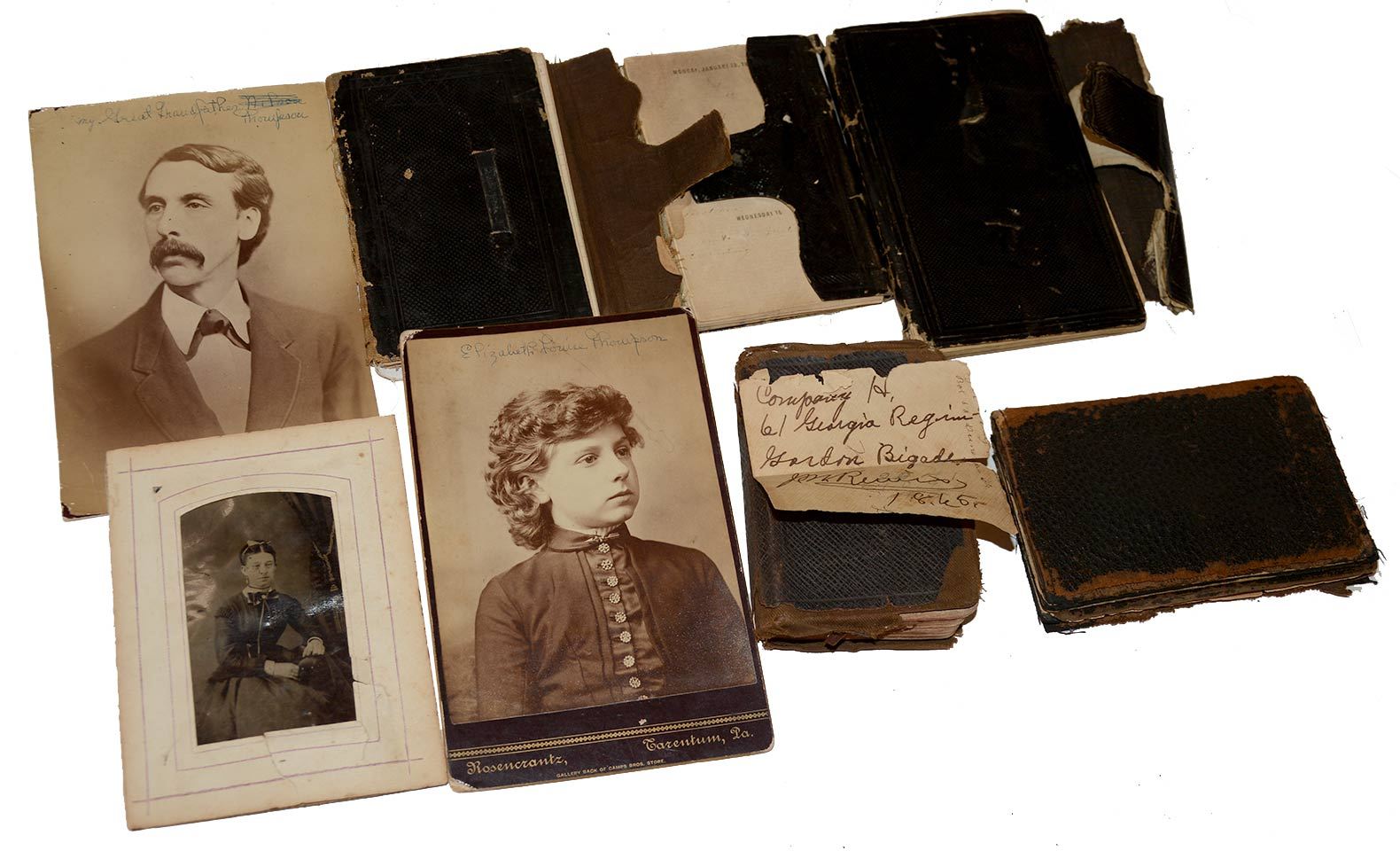
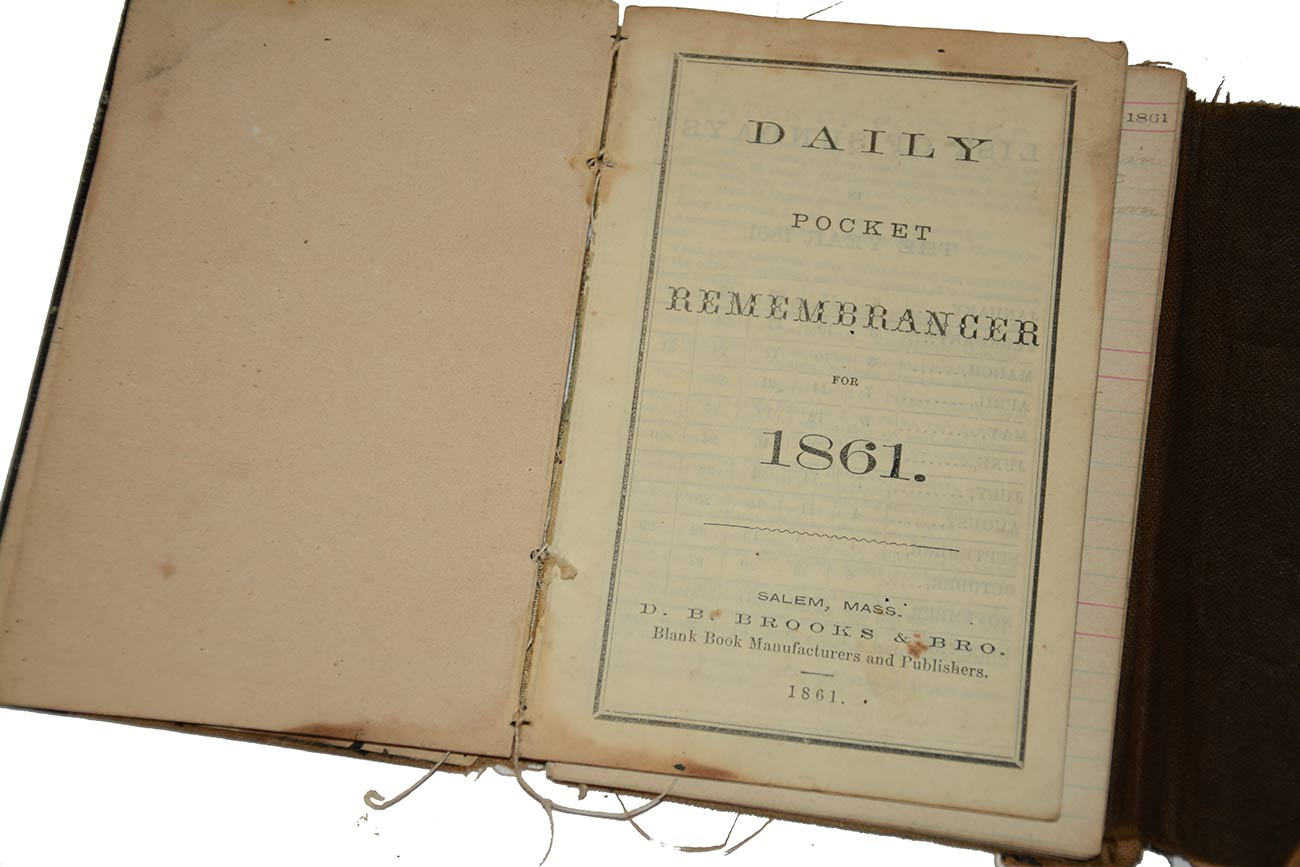
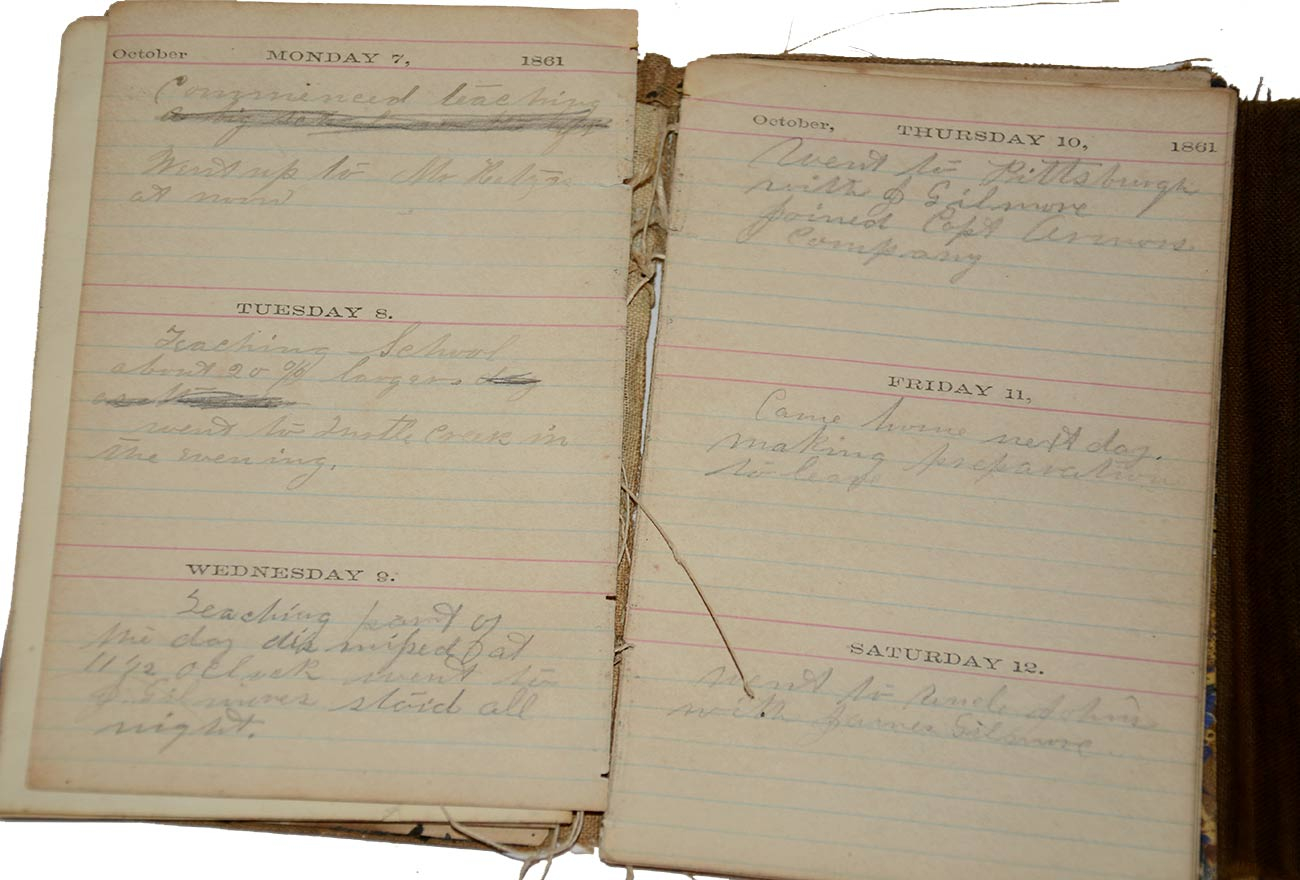
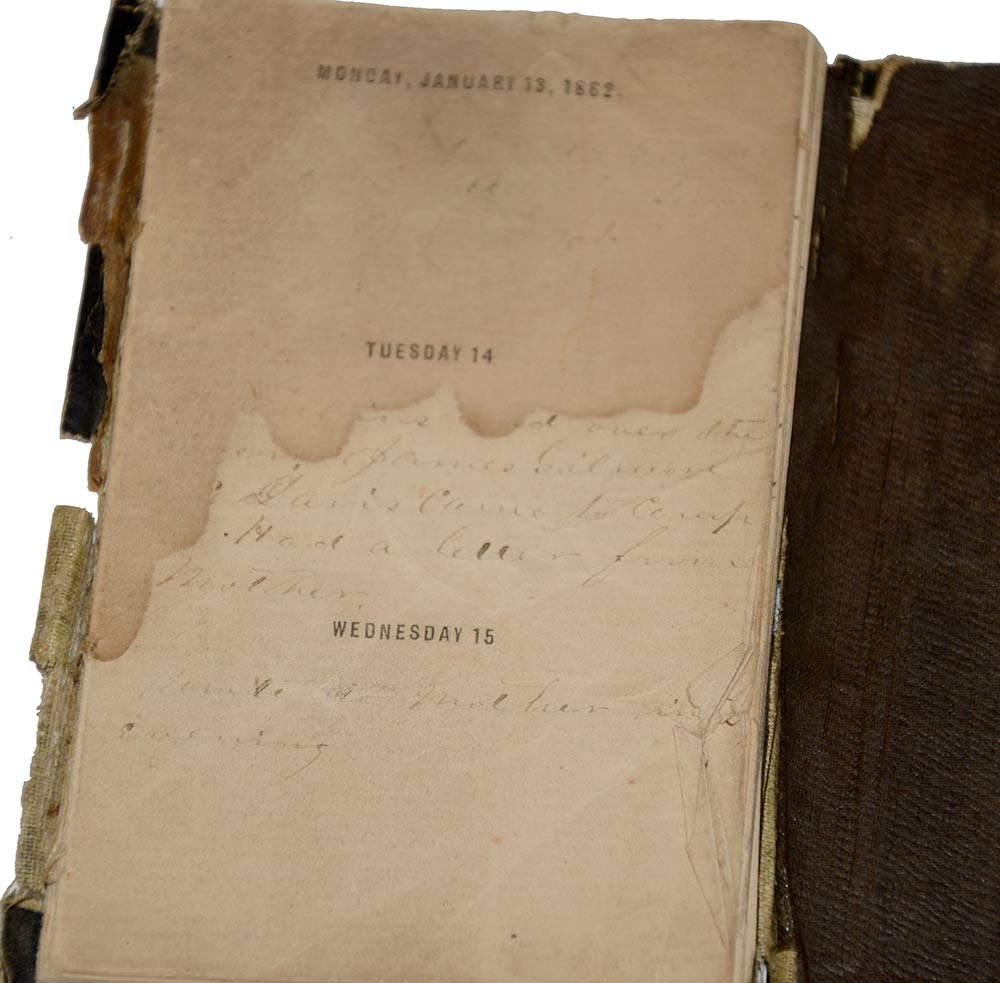
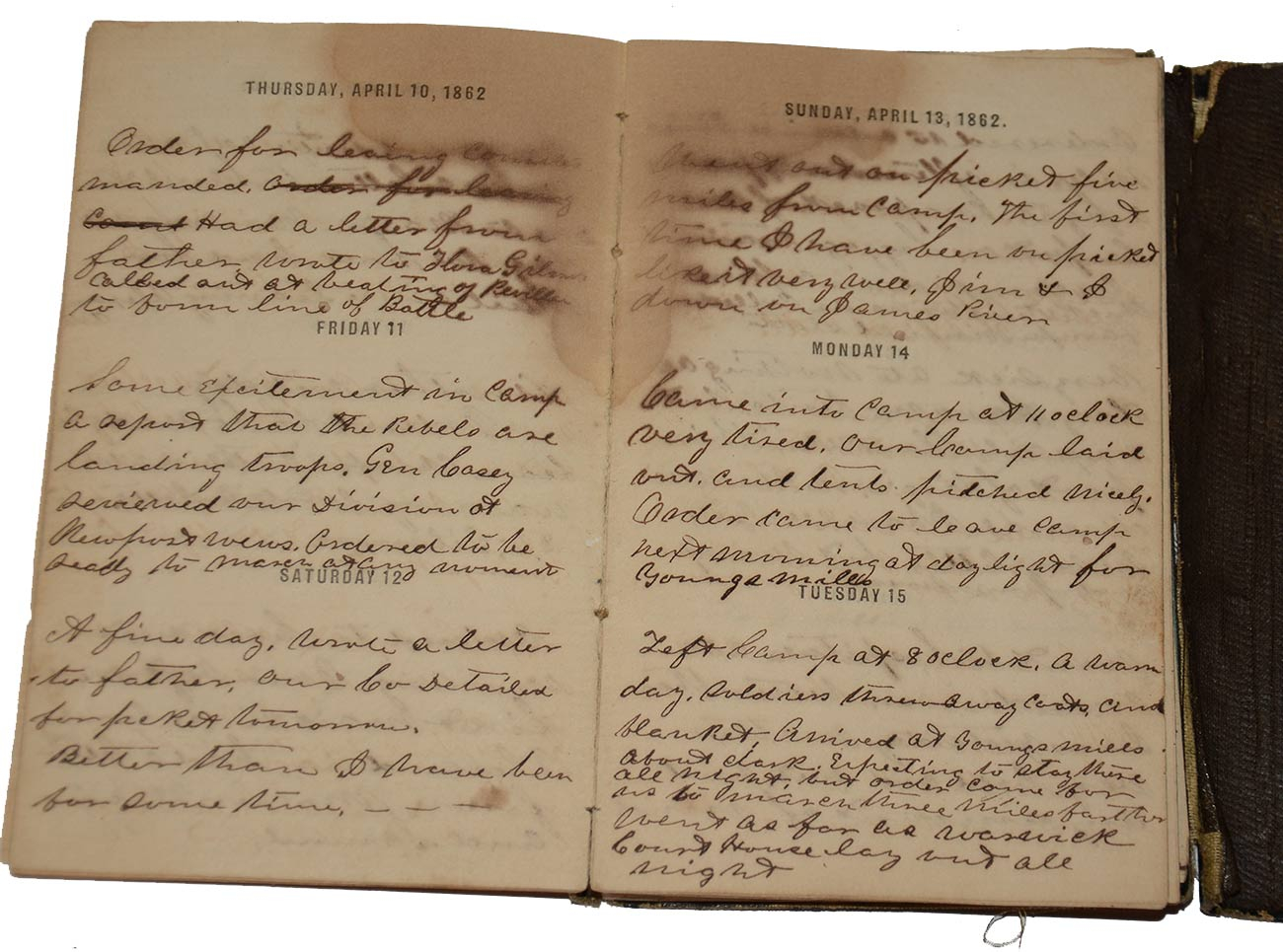
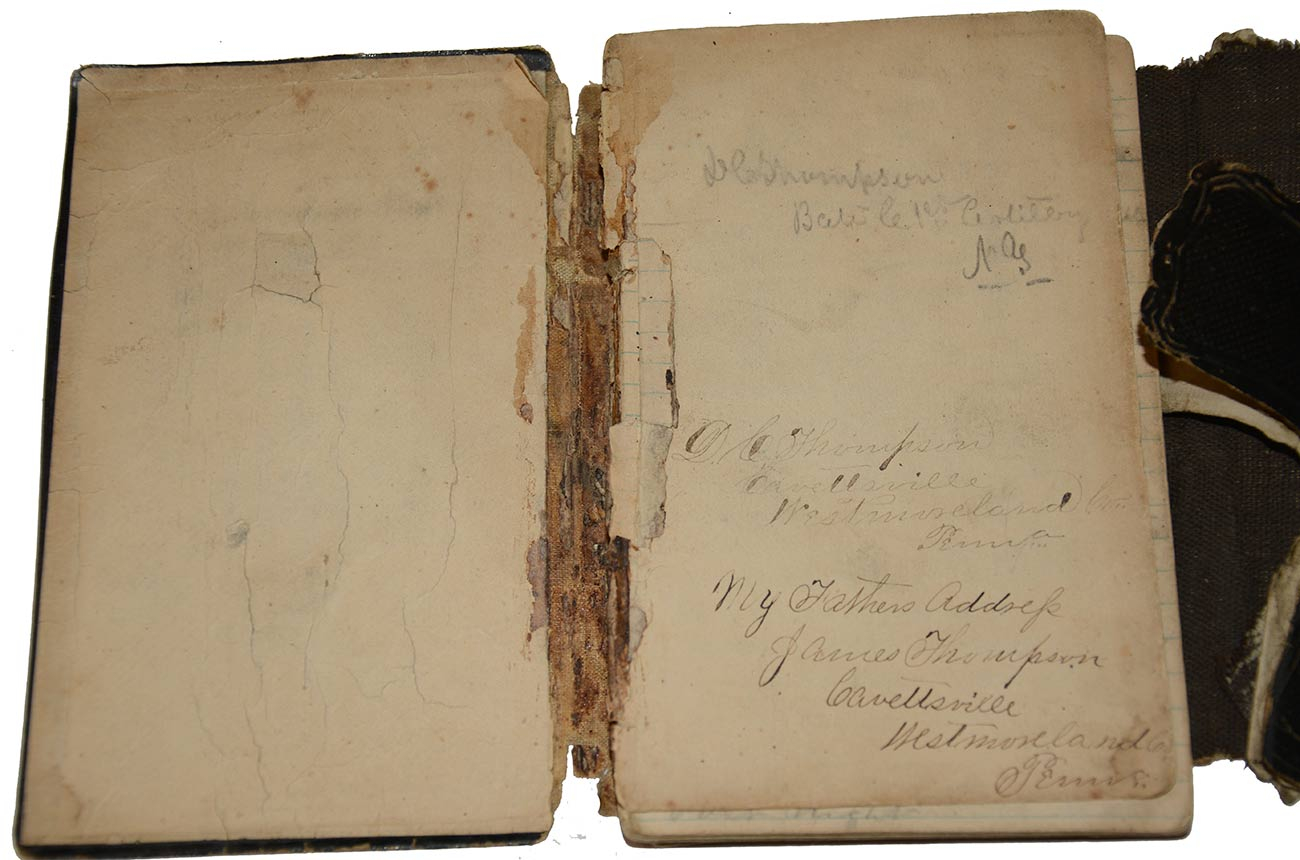
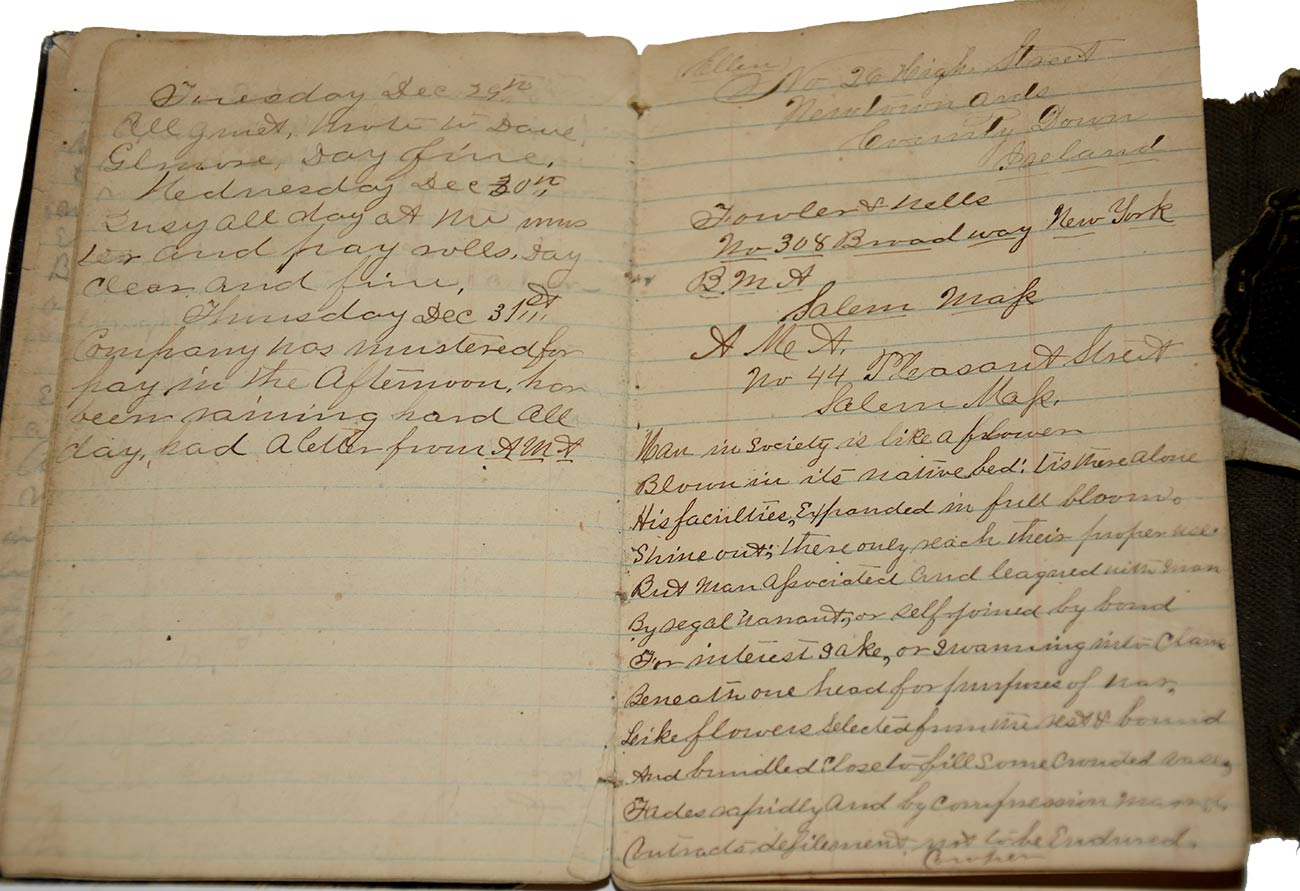
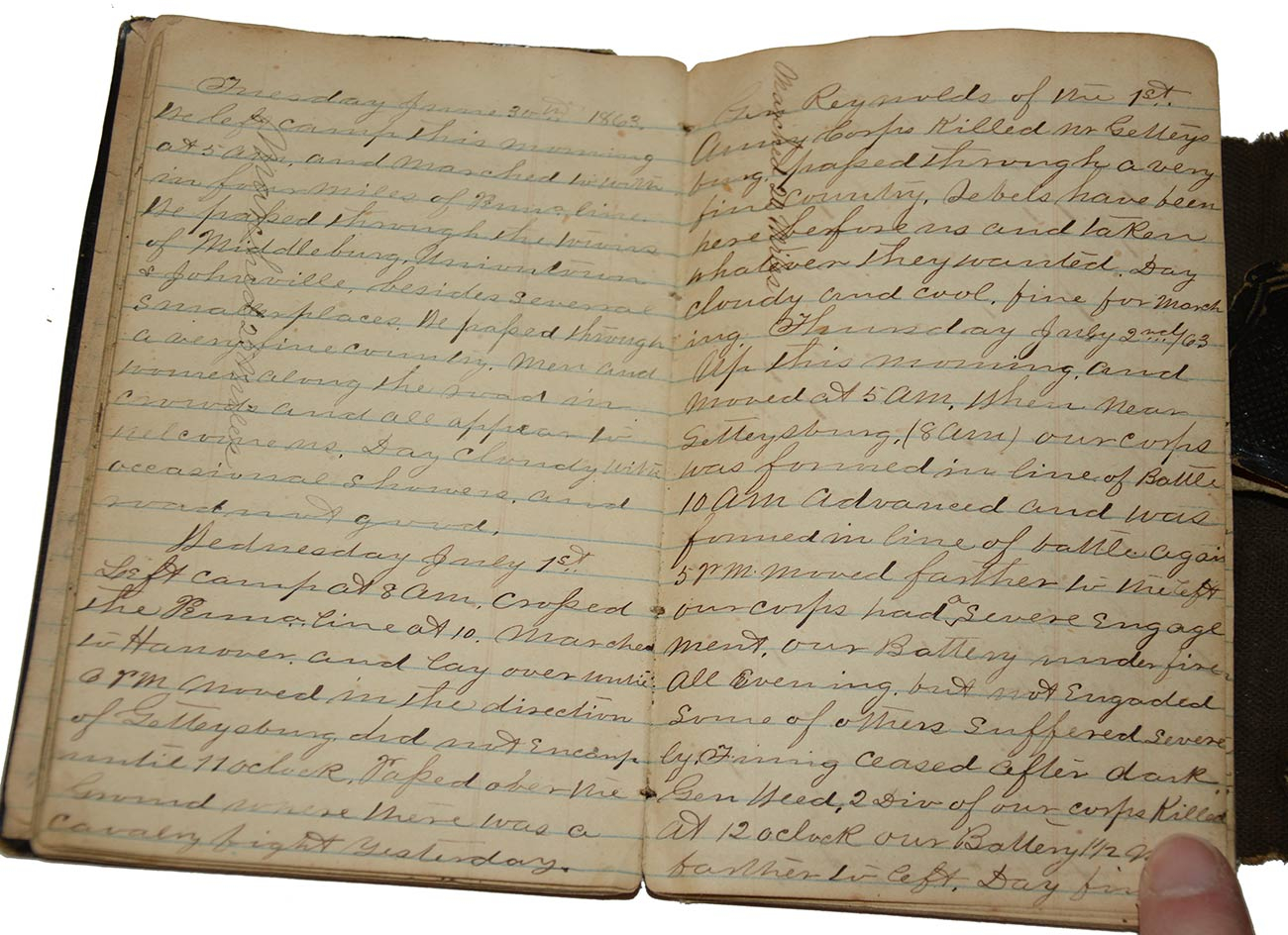
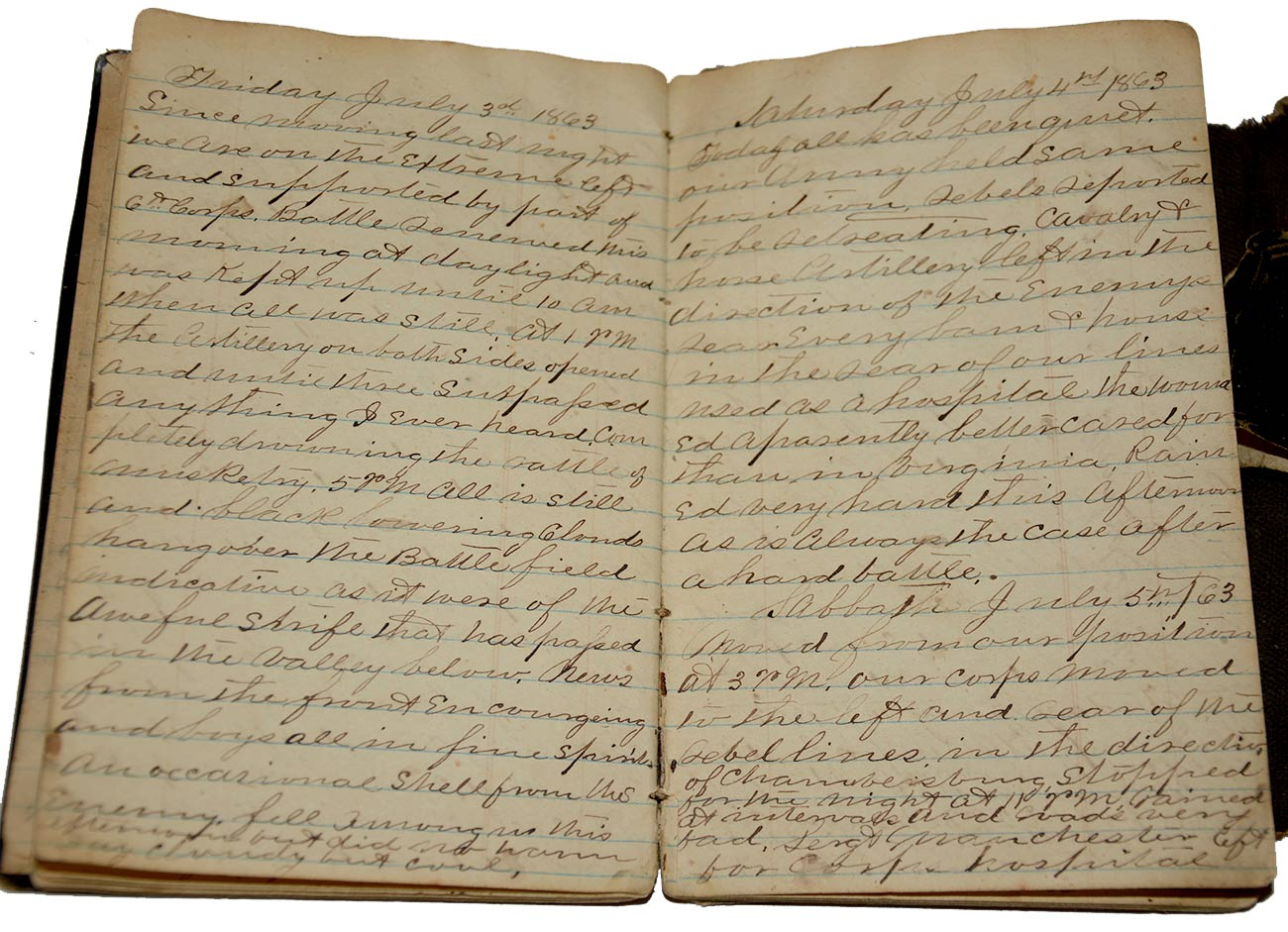
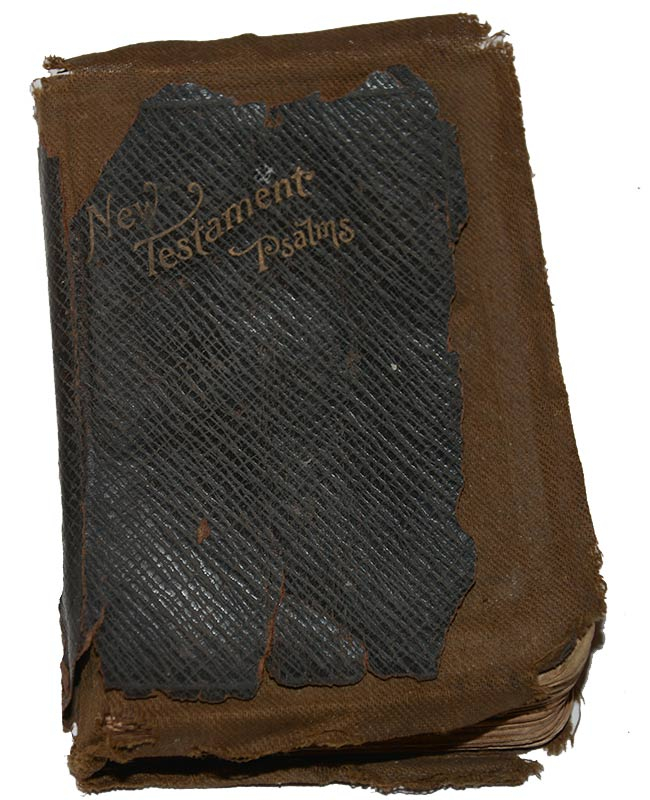
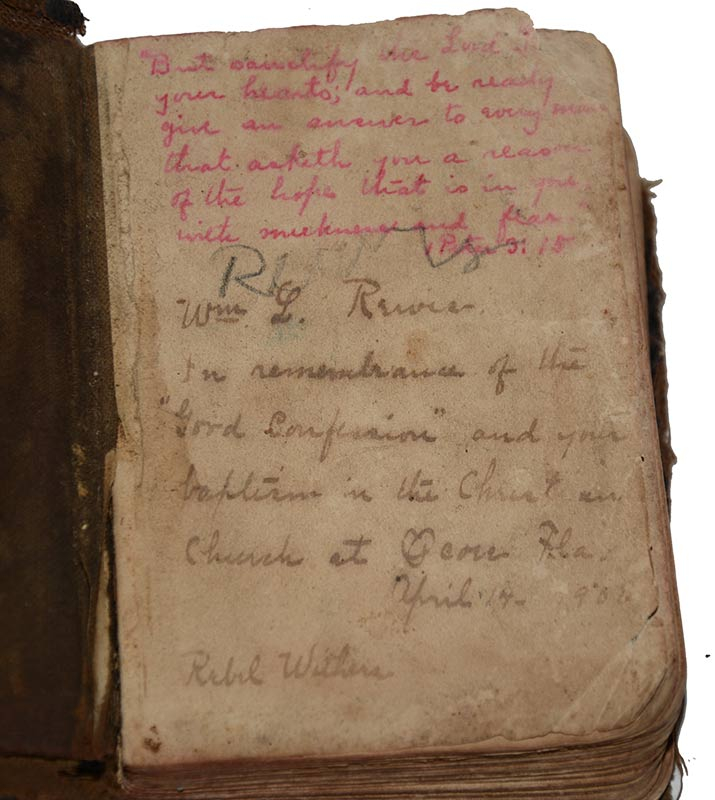
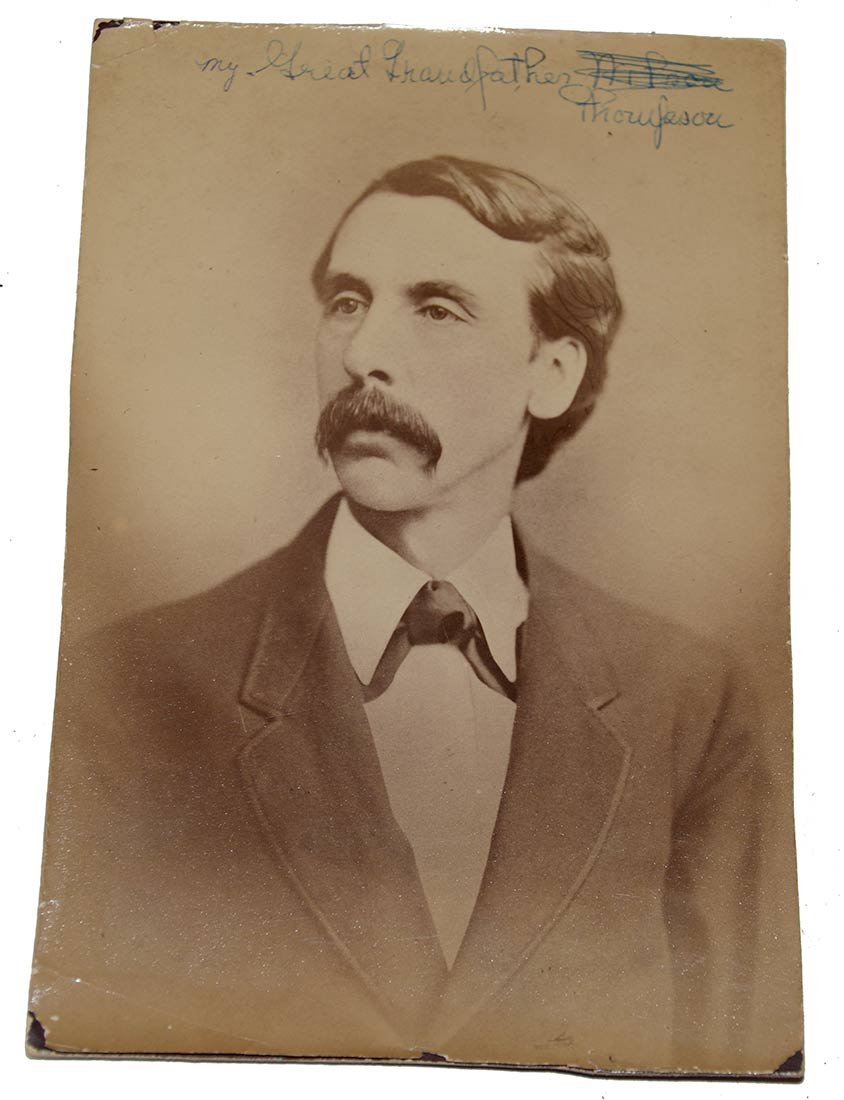
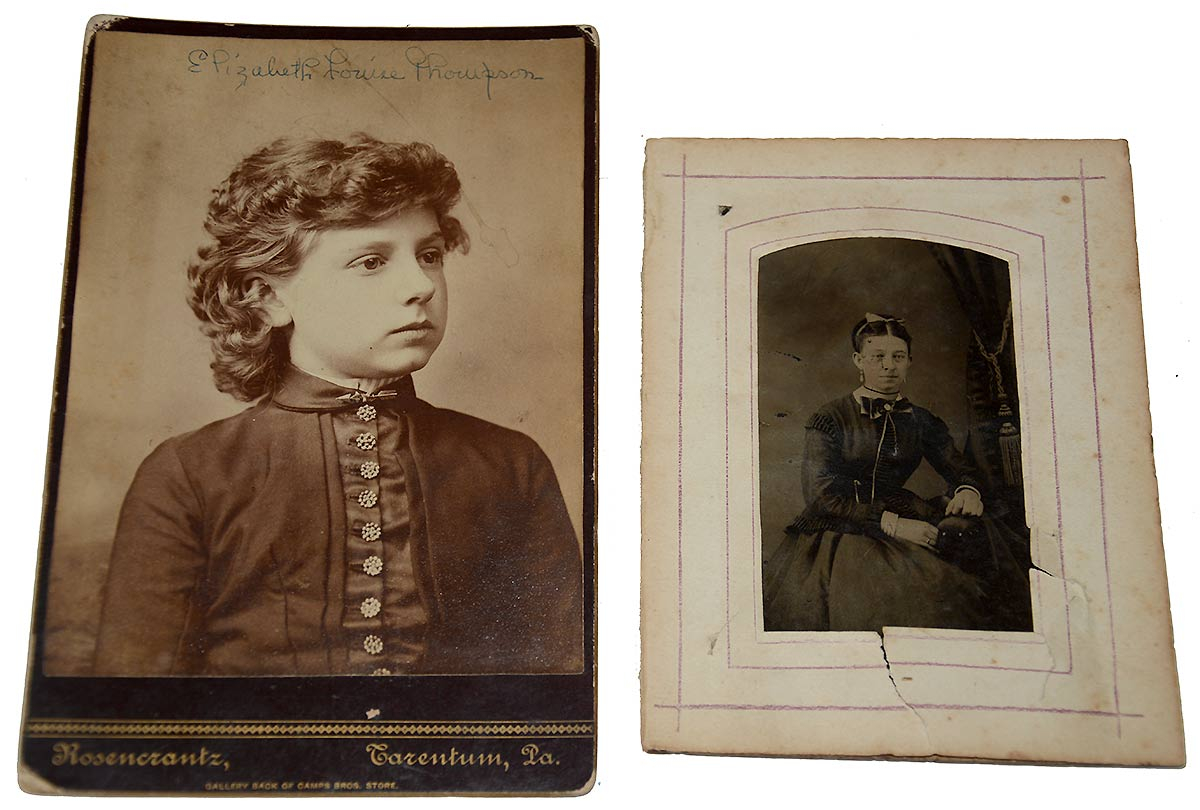
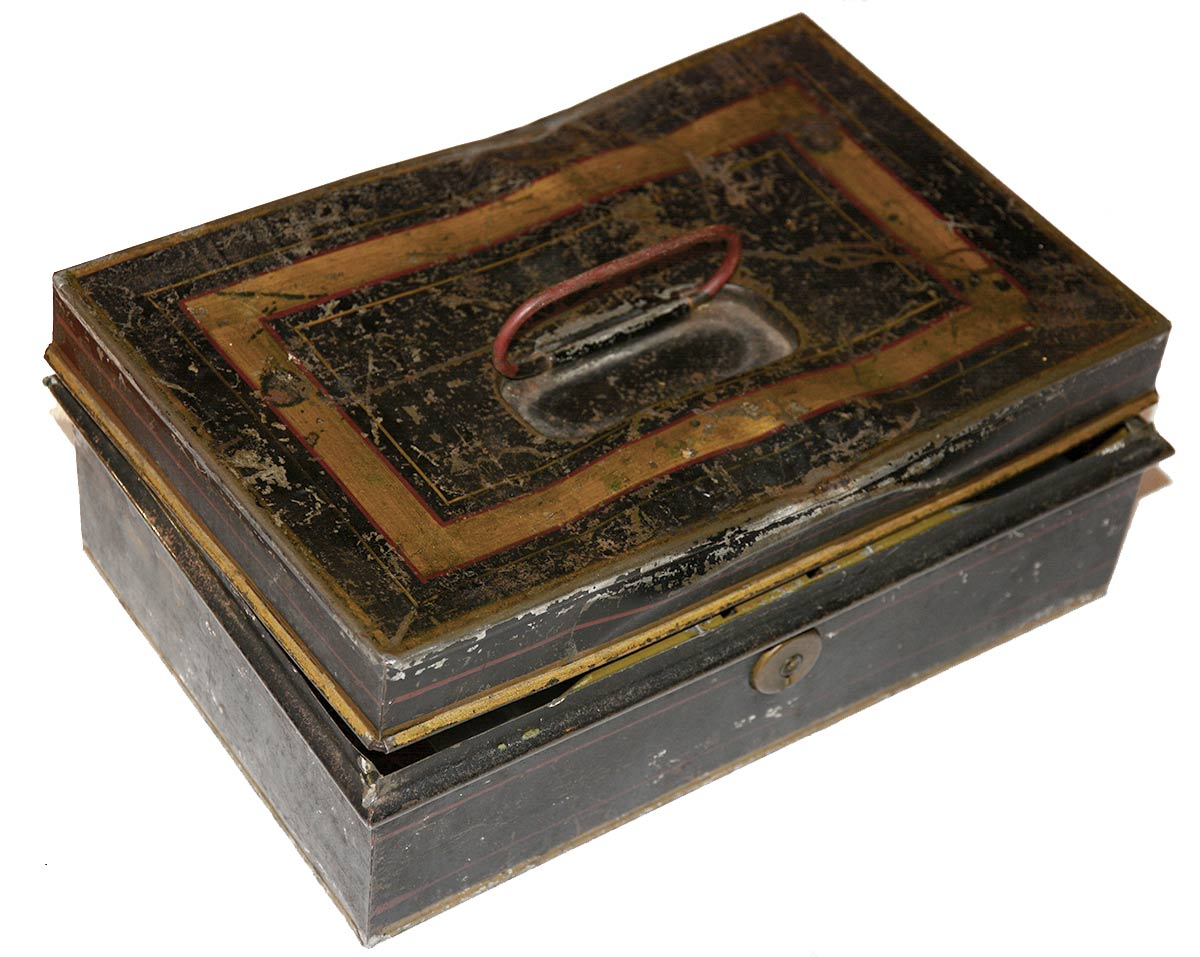
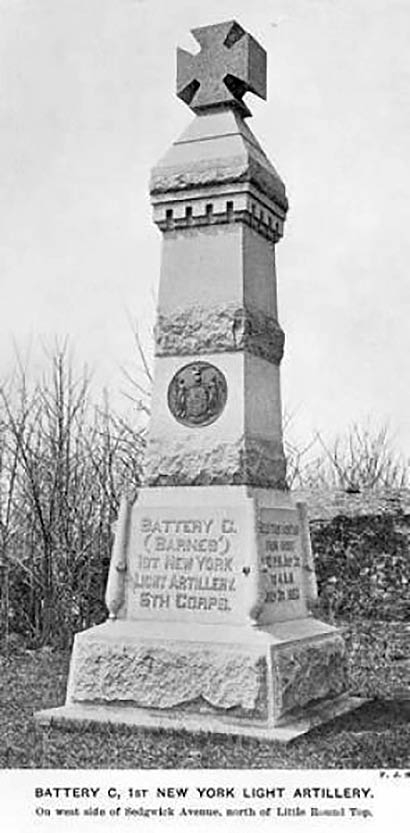
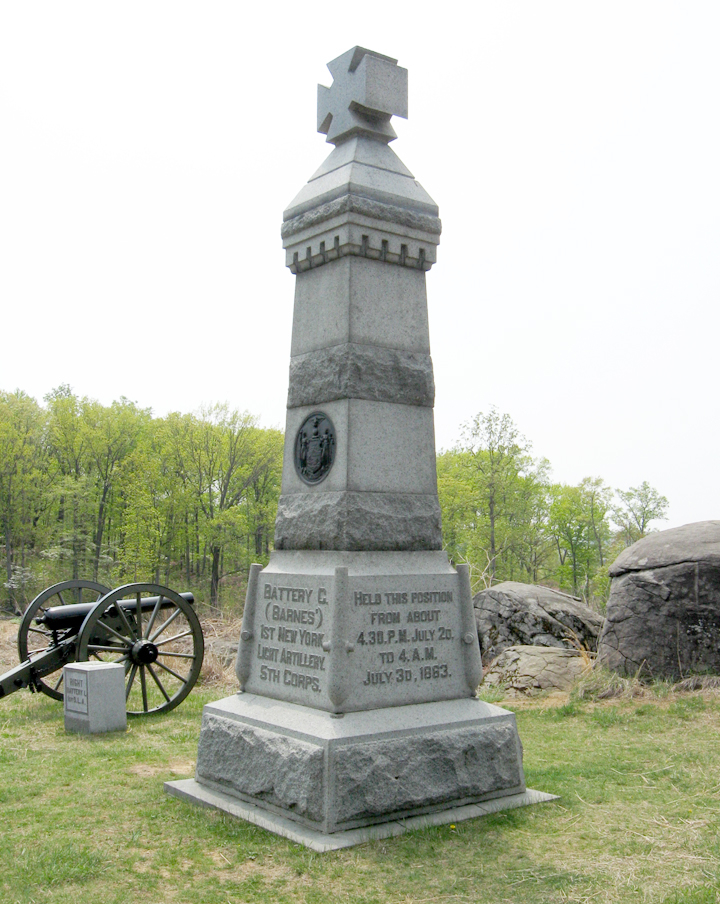
$5,950.00
Quantity Available: 1
Item Code: 2023-2639
Shipping: Determined by Method & Location of buyer
To Order:
Call 717-334-0347,
Fax 717-334-5016, or E-mail
Consists of three standard-size pocket diaries—dated 1861, 1862, 1863—detailing Thompson’s service activities, entries running from 10/4/1861 to 12/4/1863. Inscription front eps, 1863 diary—in pencil, ”D.C. Thompson/ Batt. C 1st Artillery/ NY”---in ink below, “D.C Thompson/ Cavettsville / Westmoreland Cty / PA---My Fathers Address / James Thompson / Cavettsville / Westmoreland Penna.” 1861 diary written in pencil, 1862 and ’63 diaries in ink.
Accompanied by three photos: (1) post-war bust-portrait cabinet card, 6.5” x 4.25, inscribed “My Great Grand father Thompson,” (2) Pre-war tin-type of adult female, 2” x 3.25, paper encased, w/note: “Family member could be his wife,” (3) cabinet card image of young girl, inscribed “Elizabeth Louise Thompson,” 6.5” x 4.25., back-mark ”Paul Rosencrantz / Tarentum, PA.” Also a leather bound New Testament Psalm Bible, 117 p., 2.75” x 4; front eps ink inscription to “William L. Rewis,” on the occasion of his baptism, April 14, 1906,. accompanied by faded note—“Company H / 61 Georgia Regiment / Gordon’s Brigade / James Rewis, 1865”—indicating some sort of familial connection between Georgia soldier James Rewis and baptismal bible recipient William R. Lewis.”
Condition: The three diaries are of leather, w/flap, and well worn. !861 diary is missing pages through October 1; 1862 diary missing pages from January 1-13. Front cover detached; 1863 diary covers detached. 1861-62 booklets allot 3 daily entries three entries per page, 1863 pages plain.
Cabinet card photos are bright and crisp, as is the accompanying tin-type, though somewhat darker. Psalm Testament bible exhibits worn cover while remaining intact.
All Contained in antique metal box, somewhat scuffed and battered, 3 x 6 x 9.25” painted black w/ gold trim.
**
David C. Thompson, age 22, a resident of Allegheny County, PA, enlisted as a private and was mustered into Co. “A”, 101st PA Infantry, 10/22/1861. This unit was ordered was ordered to Washington, and took part in the 1862 Peninsula Campaign, afterwards transferred to the 18th Corps, serving in the District of North Carolina through the remainder of the war.
During the early months, Thompson was constantly sick and hospitalized through the opening phase opening of the 1862 Peninsula Campaign. While convalescing in Washington, he was among 40 soldiers summarily transferred in August 1862 to fill out Battery “C”, 1st New York Light Artillery… and went on to serve with this battery through the completion of his three year enlistment, transferred back to the 101st PA for mustering out on10/31/1864.
Formed in Elmira, NY, September 1861, Battery “C” 1st New York Light Artillery, was posted to Washington, DC, defenses through August 1862, commencing campaigning just prior to the Battle of Second Manassas. On August 26th a section of guns with which Thompson was serving was captured, after which he was interned on parole, awaiting exchange in Annapolis, MD.
In the interim, the uncaptured segment of Company “C” had been engaged at Antietam and Fredericksburg, after which the company was engaged in all Battles and campaigns of the Army of the Potomac through the remainder of the war, generally in a reserve capacity, which accounts of it low casualties. During service it lost 4 men killed and 18 by disease for a total of 22. Thompson would serve the remainder of his three-year enlistment with this unit. His final diary entries cease following the Mine Run Campaign in early December 1863.
1861
Thompson’s record lists was a student/teacher at the time of his enlistment, and his iary entries reveal him to be an articulate young man. 1861 entries during the Camp Curtain phase tend to be cursory and record of mainly the numerous letters sent and received.
Of Camp Curtin, he has little good to say, writing on 18 October—“First day in camp. Tired and sleepy. Thought Camp Curtin a hard place. Very lonesome.” And again the next day—“I think very little of Camp Curtin.” On Oct. 25 he stands guard and on Oct. 26th, mentions that he is “not well, the first sign of health problems that would plague him through the following summer.
1862
Health soon becomes a central concern. Thompson reports on February 6th that he has rheumatism, and on the 7th that he is trying to obtain a furlough home, and the next day actually obtains one. On March 1st his regiment departs Camp curtain, but at home, feeling no better, he is not fit “to go back to camp.” On the 3rd he is “better, but am uneasy to hear from camp.”
The 101st PA had by then been sent to Washington, as McClellan geared up for the ’62 Peninsula Campaign. Thompson’s unit had been attached to General Casey’s Division, 4th Corps, and by late March he rejoins it, departing for Alexandria, reporting that he “slept on the ground for the first time.”
On 31 March Thompson’s regiment boards the “Georgia” at the Alexandria wharf, departing for Ft. Monroe.
April 3rd—
“Saw the Monitor, Left for Newport News at 9 am. Arrived there at 11 o’clock. Marched out two miles and encamped . Saw the wreck of Cumberland. Lay with out tents.”
April 16th—
“Ordered to advance three miles in afternoon expecting a fight. Knapsacks of our Co. put on baggage train. Encamped in a pine thicket. Afterwards called Camp Winfield Scott.”
April 17th—
"Very sick ate nothing all day. Have no tents, but our oil blankets. This part of Virgina the most dismal I have seen yet. See very little but swamps and pine forests.”
April 18th—
"Went to hospital, ate some dinner, better than I was yesterday, weather very cold and wet, and any amount of mud.”
In early May, still among the sick, Thompson remained in camp while the Battle of Williamsburg was fought.
May 7th—
"Brigade Surgeon said we would be taken to York Town and sent to Washington. Do not get any medicine and feel worse.”
Arriving in Washington, Thompson feels no better and reports that the sick are “not well taken care of.” On June 1, he has new of the Battle of Fair Oaks and writes that all “have to leave the hospital to make room for the wounded.”
June 2nd—
“All who were able left either to go to their Regts. Or to go on light duty. I am not included in those who got to go their Regts.. Doctor sent 500 of us to the camp of the 2nd DC Volunteers.
June 3rd—
“Order issued by Wadsworth assigning forty men to Batty C 1st NY Artillery. I am included in the orders. Still the same camp. Just beginning to get well, but not fit for duty.”
June 4th—
“Still in the same camp. A very rough set of men as I have ever seen. Five hundred convalescents sent to this camp. None of them will do any duty.”
June 5th—
“Went to Camp Barry on Capitol hill. All had to go in Ambulances. I think very little of the Company, and I guess they think as little of me.”
Company “C”. 1st New York Light Artillery
And so Thompson finds himself involuntarily shifted from infantry to artillery, as his iffy health slowly comes round. He sees a bit of little action on the eve of the Battle of Second Manassas, a fight in which he is captured and interned at Annapolis awaiting prisoner exchange which will not come until end of the year. As follows:
August 24th—
“Arrived at Fairfax Court House at daylight. Stopped and fed our horses ad had breakfast at Bull Run at noon. Arrived at Manassas in Evening. Encamped in a pleasant place about 1 mile from Manassas Junction. Near where Gen. Beauregard had his Head Quarters.
Rebs attacked Manassas in evening out Battery ordered out at 11 O’clock. Just out int to meet Jackson coming in. Our Co. lost guns and nine of us taken—prisoners. Rebels kept us at Manassas all day. Think very little of Jeff’s minions but much better treated than I expected. Started from Centreville in Evening. Kep marching all night but do not know where…
Stopped at ____ Church in forenoon. Names of all prisoners taken. Kept us under strong Guard all night. Have not had anything to eat but some hard crackers given at Manassas. All the prisoners 623 paroled at put into Gen. Sigels lines with flag of truce. Came to Centreville in Afternoon.
Still in same place. Expected to be sent to Washington but could not find our lines. Battle at Bull run fought. Saw it from Centerville. And our turned—wounded men coming in all day. Left for Alexandria at 3 o’clock. Stopped at Fairfax C.H. at daylight…al prisoners sent to Fort Ellsworth. Saw John Duff. Stayed with him all night. Wrote to mother.”
September 4th—Left for Washington at 8 am. Marched via Long Bridge…Left for Annapolis after dark, all night, did not get any sleep. At 6 am marched out to Pawls Camp at Annapolis in Afternoon…Wrote a letter to father. Am not well and not at all contented. Would rather be in company.
September 10th—“Doing nothing all day. Some of Penna Boys raised a riot. Three sent Annapolis jail.
September 15th—A lot of prisoners came from Richmond. Most of them barefooted and some almost naked.
October 18th—All quiet. All think we will be sent to our own states. Hope it is true.
September 20th—500 men came from Macon Ga. Most of them taken at Pittsburg Landing. (In other words, Confederate prisoners taken earlier at Shiloh).
November 4th—At Annapolis was weighed. Weigh 148. More than ever I did before.
November 19th—None of the boys would turn out on dress parade. Col. kept back our rations.
December 4th—Order read on dress Parade that we were all exchanged and must drill every day. Wrote to mother.
December 5th—
“Some of the officers took out their companies on drill. Rest of the boys rallied on them and they gave it up.”
*So ended 1862. In October Thompson noted the passage of his first year of Army life--a year marked by humdrum duty at Camp Curtain, hospitalization during the Peninsula Campaign, followed by capture at the Second Manassas, and internment at Annapolis awaiting prisoner exchange.
1863
In early January Thompson receives orders to rejoin his artillery company, attached to 5th Corps Reserve Artillery, posted with Burnside’s army across the Potomac from Fredericksburg. His entries of the 19th to 23rd detail the famous “Mud March” in which the army was marched west from Falmouth in hopes of crossing the Rappahannock and getting in Lee’s rear, only to foiled by miserable weather. As follows:
January 19th—
“Read a letter from mother, the first one I have had since leaving Camp Parole. A fine day today. We had no drill. We have positive orders to leave tomorrow. Weather fine.”
January 20th—
“Left our camp in afternoon. Pontoon train has passed and every thing looks like crossing the river. We marched two or three miles and encamped for the night. Commenced raining about 4 o’clock. I was on guard and never was out on as rough a night.”
January 21st—
“This morning every thing looks cheerless and discouraging. Guns and caissons are sticking in the mud half axle deep, but we must go. We were up and ready to leave at daybreak but didn’t go until 8. Rained all day. We marched six or seven miles and encamped in the woods. We soon had a good fire, dried ourselves and slept comfortably.”
January 22nd—Another disagreeable day. Roads are so bad that we can’t move and “Burnside Stuck in the mud,” is on every soldier’s lips. We are with the rest of our Division and are very comfortable, considering our circumstances. Had a whiskey ration given to our company.”
January 23rd—
“Left our camp and came back to where were before. Infantry had made a ‘corduroy road’, and we had much less trouble coming back than going out. Clouds cleared away in the afternoon and evening fine. Our men and horses very tired and nearly worn out.”
*Back in Falmouth opposite Frederick, Company “C” would remain there through late April. And, while Thompson mentions throughout going on picket and doing drill, he never writes of the guns or himself as member a gun crew. He does, however, mention helping to compile muster rolls and ordnance reports, which would indicate that somewhere along the way he became a company “C” clerk of sorts, whose duties also included handling regimental money. On April 16th he writes of “going to Aquia to express the money our company was sending home, had 3004 dollars.” A few days later, with General Hooker now in Army command, troop movements commence which will culminate in the Battle Chancellorsville:
April 28th—
"We are still in same camp. Part of the army crossed the river, firing at intervals all day…”
April 30th—
“…Started for the United States Ford on the Rappahannock . Encamped for the night near Hartwood Church on the Warrenton Pike. Roads bad but a pleasant day to march.”
May 1st—
“…Stopped to feed at noon. Near the Ford we crossed at one, and marched to our front four miles from the Ford. Heavy skirmishing in our front til after dark.”
May 2nd--
“…Early in the morning we moved to within a mile of the river. Infantry of our Division supporting the Batteries of the 5th Corps. Spent the day in throwing up entrenchments. Very heavy fighting 1 ½ miles to our right in evening. 11th Corps repulsed.”
May 3rd—
“At day light awakened by the roar of artillery. A short distance to our right our lines were driven in and the 5th Corps ordered to the front. The 11th came to our support. Battle raged on our right until noon. The road to the ford crowded with wounded and stragglers all forenoon. The enemys skirmishers drove in our pickets in our front in the evening. Kept up a fire until after dark. A large dwelling and out building in front of our guns burned down in the afternoon.”
May 4th—
“All has been quiet in our front today, but very heavy firing in the direction of Fredricksburg. Shurz Division supporting our batteries was relieved by that of Gen. Geary. Gen Keane formerly of the Penna. Bucktails is comdg. The Brigade in our rear. Just one year today since our army advanced on the deserted works in front of Yorktown. And little did we think that the year would pass away and its close find the “Army of the Potomac” so closely pressed farther from Richmond than it then was. But then we shortsighted creatures see but a short distance into the future. The past year has been one of hardship to me but has taught many a valuable lesson if rightly applied.
May 5—
We expected an attack today. Bodies of the enemy appeared in our front at intervals all day. The infantry strength ___ their position. And we threw up earthworks in front of our pieces. Rain began to fall heavily at four o’clock and did so more or less all night. At eight we had orders to prepare for a move. At nine the Artillery left and marched toward the ford. We were greatly delayed near the river . And did not get across until the next morning at three. The Artillery of our corps was the last crossing, and the roads had become very bad. Boys are almost worn out and everyone has something to say about Hooker..”
*Following Chancellorsville the 5th Corps returned to its old camp near Falmouth. while the Lincoln administration assessed the recent Hooker fiasco. In Richmond, Robert E. Lee persuaded Jefferson Davis to authorize an invasion of Pennsylvania to counteract a likely capitulation of Vicksburg to Grant’s forces on the Mississippi. Through May and into early June however, all seems quiet on the 5th Corp front. In late May Thompson notes that the he has “seen nothing of the enemy in our front for so far they are very sociable & anxious to exchange papers.” And on June 3rd that “it has been one year today since I was assigned to this battery.”
But, Lee’s army was now on the move, with the Army of the Potomac soon to follow. Thompson’s subsequent entries detail the movements of the 5th Corps in route to Gettysburg, with Thompson’s Company “C” having the opportunity to loot President Monroe’s former residence on the march north.
June 8—
“Occasional firing this afternoon in the direction of Culpeper. Kept up til dark.” [Referring to the cavalry Battle of Brandy Station.]
June 9th—
“our cavalry and artillery crossed the river at Kelly’s Ford, drove the rebs five miles, their pickets in our front withdrawn. 4 p.m. we moved camp to the rear. Also caissons and baggage wagons”…
June 13th—
“Everything looks like an early move. All the army is moving in the direction of Warrenton…”
June 15th—
“On the move again soon after daylight. We marched to Manassas Junction, arrive there 3 pm the rebels were in force a short distance to our left. Our crops was formed in line of battle near the Junction. Our battery in position in one of the old rebel forts. We are bit 500 yards from where we lost our guns last august. And I was taken prisoner.”
June 21st—
“This morning we awake to hear the roar of Artillery only a short distance. In advance our cavalry drove the rebs to Snickers Gap, firing was kept up all day.”
June 22nd—
“Our cavalry fell back to near Aldie. All the wagons sent to the rear, the three pieces of horse Artillery takin from the rebels came back to Aldie.”
June 24th—
“This morning the men & horses belonging to the Corps Artillery turned out to go for hay. Went to what was the residence of President Monroe, now owned by Major Fairfax of the rebel army, found it in abundance. Asked no questions but brought off all we could carry. A splendid farm and buildings and has suffered very little from the Effects of the war [until now].”
June 26th—
Left camp this morning at 6 am. Crossed Goose Creek at Oatland Mills. Rebels had burnt bridge. We had some trouble crossing, creek being very high. Passed through Leesburg at 2 pm. Arrived at Edwards ferry on the Potomac at 3 pm, passed the Battle of Balls Bluff battleground, crossed on the pontoons and marched to near Poolesville Md. Did not encamp until after 8 o’clock. Men and horses very tired…we had a meansome march.”
June 27th—
“Moved from camp at 5 am. marched to within two miles of Frederick Town Md. Passed through beautiful country and found more of a Union feeling than we soldiers are accustomed to see…”
June 28th—
Gen. Hooker relieved of the command of the army of the Potomac and Gen. Meade of our crops appointed his successor…”
June 29th—
“Left camp this forenoon at 10 am. We passed Fredricktown on the right and marched until 8 o’clock at night. Stopped Fredericktown sent $45 home by express…”
June 30th—
“We left camp this morning and marched to within four miles of the Penna. Line. We passed through the town of Middleburg, Uniontown & Johnville, besides several smaller places. Men and women along the road in crowds and all appear to welcome us.”
July 1st—
Left camp at 8 am. Crossed the Penna. Line at 10. Marched to Hanover and lay over until 6 pm. Moved in the direction of Gettysburg and did not encamp until 11 o’clock. Passed over the ground were there was a cavalry fight yesterday. (marched 20 miles.) Gen Reynolds of the 1st Corps killed nr Gettysburg. Passed through a very fine country. Rebels have been here before us and taken whatever they wanted…”
July 2nd—
“Moved at 5 am. When we got to Gettysburg (8 am) our corps was formed in line of battle again. 5 pm moved farther to the left. Our corps had a severe engagement. Our battery under fire all evening, but not engaged. Some of other suffered severely.”
July 3rd—
“Since morning last night we are the extreme left supported by part of 6th Corps. Battle renewed this morning at daylight and was kept up until 10 am when all was still. At 1PM the artillery on both sides opened and until three surpassed anything I ever heard. Completely drowning the rattle of musketry. 5 PM all is still and black lowering clouds hangover the Battlefield indicative as it were of the awesome strife that has passed in the valley below. New from the front encouraging and boys all in fine spirits. An occasional shell from the Enemy fell among us this afternoon but did no harm this afternoon. Day cloudy but cool.”
July 4th—
“Today has been quiet. Our army held same position, rebels reported to be retreating. Cavalry and Horse Artillery left in the direction of the enemy. Near every barn & house in the rear of our lines used as a hospital. The wounded apparently better cared for than in Virginia. Rained very hard this afternoon as is always the case after a hard battle…”
July 5th—
“Moved from our position at 3 PM. Our corps moved to the left and rear of the rebel lines in the direction of Chambersburg. Stopped for the night at 10 PM. Rained at intervals and roads very bad.”
Thompson continues his account of the pursuit of Lee’s retreating Confederates to Falling Waters, MD, concluding with these entries:
July 13th—
“March this morning at 6 , passed through Boonsboro. Near there struck the road. We passed over coming down crossed South Mountain after dark. Encamped at 10 pm. Had a very severe march. Our hopes more worn out than they have been since leaving the Rappahannock…”
July 14th—
“Moved from camp…9 o’clock the rebs have retreated. Our battery and the Penna Reserves moved in advance support for the Cavalry. Several skirmishes with their rear guard. A severe engagement. At Falling water their point of crossing. At 3 pm turned around marched back…and a hard day to march.”
*During autumn, as Generals Meade and Lee maneuvered for position between the Rappahannock and Rapidan Rivers, Thompson’s Company “C”, 1st New York Light Arty. became caught up in the Bristoe Station and Mine Campaigns of October and November.
October 14th—[Bristoe Station, VA]
“Had reveille this morning at 3 am. and marched 5. After crossing Kettle Run near Bristoe Station Corps was halted for dinner. After marching out our Battery and Penn. Reserves, were unexpectedly fired into by a battery of the Rebs posted on a hill a mile in our rear. Column was haledt and our battery supported by the reserves opened on the enemy and soon silenced their guns, when we fell back to Manassas Junction. Several of the Reserves were killed and wounded by none of our men were hurt. About this time we fell back the 2nd Corps on the other side of the RR were attacked by the Rebs. We were ordered back for support but were not needed. The 2nd Corps repulsed the enemy taking five guns & & 45 prisoners. At 8 Pm we commenced to fall back. Crossed Bullrun at 1 am where we encamped. Had a very wearisome days duty.”
October 19th—
“Marched from camp this morning at 6 am. Passed Centreville at 9 am. About 5 PM we encamped at Groveton on the old Bull Run battle field, and near where I was paroled Aug. 30th 1862. In many places the bodies have been so thinly covered that the skulls and other bones are bare.”
Mine run Campaign
November 26th—
“We all ready to move at daylight but did not march til 7…on Plank Road leading to Orange C.H. Cavalry in advance of us skirmishing with the enemy all forenoon. About three they made a stand at New Hope Church under cover of heavy pine woods. Our Corps advance the support of the cavalry which suffered severely, our battery and 3rd division engaged until dark. Under heavy artillery fire but lost no men. Slept by the guns over night. This morning soon after moving our brigade trains were attacked by guerrillas, mules were cut lose from 25 wagons, which were afterwards set fire…”
November 29th—
“Soon after daylight our battery moved to the front our line of battle on a ridge hills on the north side of Mine river, that of the Rebels on the opposite side, both Armies all days entrenching themselves. All quiet but the skirmishing of the sharpshooters. Day very cold.”
November 30th--
At 8 am the Arty opened all along out line but “Nary a reb” was to be seen. Our line of skirmishers crossed the creek& advanced almost to their works, when their artillery opened. An alternate artillery fire kept up all day without serious damage to either party. The intended charge on their earthwork given up. Day very cold, and ground frozen very hard.
December 1st—
This morning our trains and Reserve Artillery commenced moving to the rear. Rebels still strengthening their position which now almost impregnable. Last night the coldest I have ever seen in Virginia . Number of the pickets of both armies frozen to death on their posts. About dark we commenced falling back to the Rapidan, march all night, and at three AM crossed the River at Germaniaford. After crossing marched about a mile & encamped. The moon at the full. And a beautiful clearing night, but very cold.
*Although Private Thompson would serve on and his battery of New York Light Artillery would be present at all the major battles of the following year—The Wilderness, Spotsylvania Courthouse, etc.-- his diary ends here. The final entry:
December 4th—
Order issued that the duty of guarding the RR was assigned to the 5th Corps, our battery and 2nd Division to move to Warrenton Junction. We marched at 8 am…”
**
In all, an interesting diary grouping, w/sustained daily entries from October 1961 through November I863, which includes and covers Gettysburg Campaign from a 5th Corps perspective. (Also Including a Rewis family New Testament Psalm book inviting research for possible connection with J.M. Rewis, Co. H., 61st Georgia Infantry)
Through those and the following months to the close of his enlistment, David Thompson saw of a deal of the war—in two branches of service (infantry and artillery), first as hospital inmate and interned POW, and then as an artilleryman in the field (2nd Manassas, “The Mud March”, Chancellorsville and Gettysburg through Mine Run, et al). And, while he and his Artillery battery performed mostly in reserve, and experienced light casualties…they nonetheless marched the miles and went the distance, contributing their mite.
Invites further research.
Note: The Company “C”, New York Light Artillery Gettysburg Monument may be seen on the Union line near the General Sedgewick monument at the junction of Wheatfield Road and Sedgwick Avenue.
[JP][ph:L]
~~~~~~~~~~~~~~~~~~~~~~~~~~~~~~~~~~~
THIS ITEM, AS WITH ALL OTHER ITEMS AVAILABLE ON OUR WEB SITE,
MAY BE PURCHASED THROUGH OUR LAYAWAY PROGRAM.
CLICK HERE FOR OUR POLICIES AND TERMS.
THANK YOU!
Inquire About UNION SOLDIER DIARY GROUPING - PRIVATE DAVID C. THOMPSON, COMPANY “C”, NEW YORK 1ST LIGHT ARTILLERY [GETTYSBURG UNIT] / CO “A”, 101ST PENNSYLVANIA INFANTRY
Most Popular
Historical Firearms Stolen From The National Civil War Museum In Harrisburg, Pa »
Theft From Gravesite Of Gen. John Reynolds »
Selection Of Unframed Prints By Don Troiani »
Fine Condition Brass Infantry Bugle Insignia »
featured item
SCARCE VIEW OF CONFEDERATE GENERAL THOMAS ROSSER FROM THE ALBUM OF R. CHANNING PRICE PRESENTED TO HIM BY JEB STUART
CDV is a full standing view of Thomas L. Rosser wearing a dark civilian frock coat with a white vest and dark cravat with matching white trousers. He holds his dark hat in his hand, just behind his waist. Rosser is posed in front of a painted… (846-497). Learn More »


